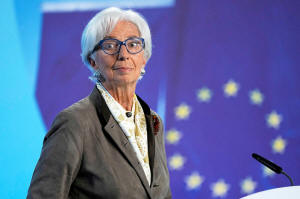Europe's top central banker says economy holding up better than expected
in face of Trump tariffs
[October 01, 2025] By
DAVID McHUGH
FRANKFURT, Germany (AP) — Europe's economy is holding up better than
expected in the face of U.S. President Donald Trump's new tariffs - in
part because the European Union didn't retaliate with self-defeating
tariffs of its own, the head of the European Central Bank said Tuesday.
Christine Lagarde said the impact of Trump's trade war on growth and
inflation in the 20 countries that use the euro currency had also been
softened by a stronger euro and by conclusion of a trade deal with
Trump. The deal capped tariffs at 15% and took away uncertainty that
threatened to delay or disrupt business investment.
“A year ago, most would have assumed that U.S. tariffs... would trigger
a major adverse shock to the euro area economy,” Large said in a speech
delivered at a central banking conference in Helsinki, Finland. “Yet
some of these assumptions have not been borne out.”
There had been little impact on inflation, she said, and effects on
growth have been “relatively moderate” due to European governments
taking pro-growth measures in response. Lagarde said that as a result
the ECB's interest rate policy was “in a good place” and that
accordingly the bank couldn't commit to any future rate path, whether
one of action or inaction.” The bank's next policy meeting is slated for
Oct. 30; the bank left its key rate unchanged at 2% at its last meeting
Sept. 11.

The European Union's executive commission prepared a list of goods to
hit with retaliatory tariffs, or import taxes, but suspended them once
the tariff deal was struck between Trump and Commission President Ursula
von der Leyen in July. The reasons for nonretaliation included pressure
from business groups not to get into a prolonged cycle of tit-for-tat
tariff increases, as well as concerns about jeopardizing US support for
Ukraine.
As a result, Europe was still getting the imported raw materials and
goods that it needs for its economy without hindrance from high tariff
cost or bottlenecks that could raise prices. “As a result, we have not
yet seen significant supply chain disruption,” Lagarde said. “Global
supply chain pressures remain contained, and in the euro area,
bottleneck indicators are close to historical averages.”
[to top of second column] |

President of the European Central Bank Christine Lagarde briefs the
media during a press conference at the bank's headquarters in
Frankfurt, Germany, Thursday, Sept. 11, 2025. (AP Photo/Michael
Probst, File)
 Trump's policies have been
accompanied by a fall in the dollar and a correspondent
strengthening of the euro. That makes Europe's imports cheaper and
helps the ECB in its efforts to contain the annual rate of
inflation, which was a moderate 2% in August.
So far, Trump’s series of import taxes appears to have sown more
concerns within the U.S. economy, as hiring has sharply cooled while
inflation remains elevated. The cost of the tariffs are generally
paid by domestic consumers and businesses, even if the taxes can
disrupt the sales of foreign companies.
The EU and member governments have taken other measures to
strengthen growth, such as free trade deals with the South American
Mercosur countries - Argentina, Brazil, Bolivia, Paraguan and
Uruguay - and with Mexico. National governments have ramped up
defense spending due to the perceived threat from a newly aggressive
Russia, while Germany has committed to large-scale investment in
roads, rails and bridges after years of underspending.
Nonetheless, growth remains mediocre, coming in at only 0.1% in the
second quarter over the quarter before. Tariffs and the associated
uncertainty will still knock some 0.7% percentage points off through
2025 and 2027.
—-
Associated Press Writer Josh Boak contributed from Washington.
All contents © copyright 2025 Associated Press. All rights reserved
 |